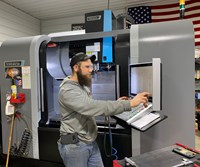What Is In a Word?
Moving dirt to suit the needs of construction and development is a challenge as old as civilization. Moving molecules and microscopic components is a challenge that is years or decades old.
Moving dirt to suit the needs of construction and development is a challenge as old as civilization. Moving molecules and microscopic components is a challenge that is years or decades old. Which of these challenges involves "technology"?
Public opinion thinks it knows the answer. We are already comfortable with the term "nanotechnology." On the Web, nano.gov reports on the government's efforts to (among other things) "educate the workforce necessary for the future of nanotechnology." Compare this to earthmoving, which does not receive the same reception. There is no word like "excavotechnology," and there is no dirt.gov.
How much sense does this make? We treat an endeavor such as earthmoving as a settled question, simply because we understand its scope. Meanwhile, people in the investment, government and media communities assign or withhold the term "technology," not according to the engineering challenge alone, but also according to a vague sense of the newness and freshness of the pursuit. This bias is more than just an amusing quirk, because those investment, government and media figures all may influence how brainpower and resources are directed.
Let's take nothing away from the promise, the importance and the challenge of nano-scale engineering; that's not the point. However, there is a fallacy in allowing a challenge such as earthmoving to occupy such a low status by comparison.
That fallacy became apparent at a manufacturing technology forum held in Ann Arbor, Michigan, this summer. It was presented by the National Center for Manufacturing Sciences and AMT—the Association For Manufacturing Technology. One of the speakers was a director of manufacturing R&D with Caterpillar, a company on the front lines of the worldwide development boom. In addition to innovating better earthmoving equipment, this company must innovate even more aggressively in its manufacturing processes, and the speaker plainly stated the reason why. "We won't outsource," he said—meaning the company won't send significant local manufacturing work overseas. The parts are simply too big. Equipment used in North America will be made in North America, so this company is committed to the society-enriching technological challenge of manufacturing right where it is. Is such a challenge any less weighty or valuable than the newer challenges associated with something like nano engineering?
I know I am preaching to the choir. Those who receive this magazine already appreciate manufacturing's value. Many of us also know how difficult it can be to communicate that appreciation outside our industry. That's because communication does not begin with a speaker; it begins with a receptive audience.
However, here is a first step: Let's take back the word "technology." Doing so would involve not just applying the word to our own endeavors, but also challenging the word when we find it misapplied. Does software programming represent "technology," for example? It is generally given this label. But consider that the pure act of programming does not consist of applying knowledge in new ways; it consists of documenting instructions for tasks that are already known.
Those investment, government and media figures already do understand something vital. Technology will indeed be the key to our society's growth, wealth and stability in the future. Our talent and resources really do deserve to be directed toward technology. When speaking to people of influence outside of our industry, begin with this shared understanding. But define the term.
Technology is "the practical application of knowledge," says one dictionary. This general definition may seem inclusively broad. Yet does everything that gets called "technology" really meet this standard? Does it embody the goal of applying our knowledge in the most practical ways? I don't think so. And the word is too valuable to allow it to be used so lightly.
Read Next
The Cut Scene: The Finer Details of Large-Format Machining
Small details and features can have an outsized impact on large parts, such as Barbco’s collapsible utility drill head.
Read More3 Mistakes That Cause CNC Programs to Fail
Despite enhancements to manufacturing technology, there are still issues today that can cause programs to fail. These failures can cause lost time, scrapped parts, damaged machines and even injured operators.
Read More
.jpg;width=70;height=70;mode=crop)







.png;maxWidth=300;quality=90)







.png;maxWidth=300;quality=90)



